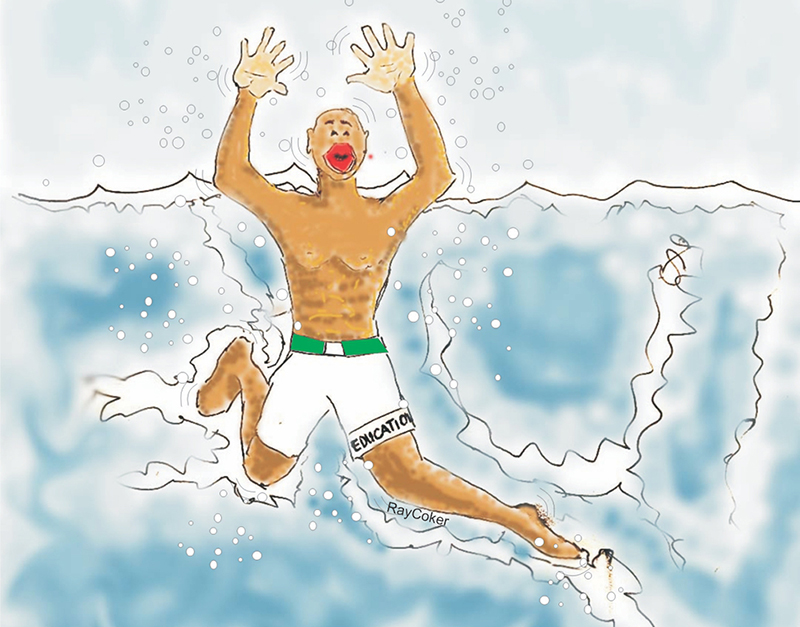
Jimi Solanke
Jimi Solanke, the prolific artist, poet, and singer, rose to fame in Nigeria with his children’s television shows- Storyland and African Stories. The success of these TV programmes for the Children belt on Nigeria Television Authority (NTA) stems from the style he adopted in telling a story to the accompaniment of songs, which made it so irresistible for the kids. He believed that through folklore, Africa’s lost values could be restored in the children.
He started his formal primary education at Olowogbowo Methodist School, Lagos, and won many prizes at the end-of-the-year cultural shows. As a child, he was also good at repairing things, always on hand to fix the father’s gramophone.
The societal perception of Engineers and Lawyers as being respectable people informed his father’s desire for his son to be an Engineer.
His father thought it would be better for him to attend secondary school outside Lagos so that he would not detract from that path, so he was taken to Odogbolu Grammar School, Ogun State for his secondary education.
After his secondary education, he was taken to Ibadan to train with Caxton Press, Eleyele, as an engineer. He stayed with his Uncle at Ibadan where he was asked to stay at the boys’ quarters. Instead of committing himself to the training, he would sneak out of the house to sing at nightclubs. Before long, his escapades started taking a toll on him because he would find a corner at the workshop to doze off. At the end of the day, he would return home with oil-soiled smelly fingers.
His uncle did not notice his pranks because he was in the main house all the time until the General Manager of the company complained that the boy in his care had no interest in the training. This prompted the uncle to send him packing out of his house.
Jimi moved out to join another uncle, and later he started a radio programme called Hello Fans gained popularity on the airwaves. This got his father angrier.
He continued to feature at Mbari Club in Ibadan, where faith pushed him to encounter intellectuals who helped to shape his career in the Arts. These were people in the academia, who used the venue to brainstorm and plan to set up a school of drama, the first in Africa.
It was the gathering of great minds comprising people like Wole Soyinka, Chief Segun Olusola, Dr. Hendrixon, Ralph Opara, Christopher Okigbo, Aigboje Igo, Tunji Oyelana, Demola Obileye, Taiye Obileye, Demas Nwoko, and
Begum Hendrickse, who were all poets and artists, wrote plays that they would act on.
Jimi Solanke counted himself privileged to be one of the first sets to be trained in the institute, which later transformed into the Department of Theatre Arts at the University of Ibadan. The institute awarded him a Diploma, and he later became an instructor in the Department of Theatre Arts, University of Ibadan, while some others furthered their education.
At Ibadan, they started a troupe that performed on the WNBS/WNTV Orisun Theatre series. He was already making waves as a singer, and some of his songs were already played on the radio.
In 1969, Michael Crowder and others moved from the University of Ibadan to the University of Ife to start the Ife Festival of Arts. He was attracted and invited by Ola Rotimi to be his assistant and that of Peggy Harper in drama and dance, respectively.
Jimi Solanke has written many stories and dramas for children and has worked with so many notable organizations, such as UNICEF, the McArthur Foundation, and the Ministry Of Health, and lectured at many Institute of Arts, to mention but a few.
He was never put down for his lack of a University degree but was always filled with pride and a sense of accomplishment.
“Nobody dares ask me about my certificates because my jobs have certified me,” he said. He also prefers the theatre to films and television as they interrupt the flow of his expressions.
To Jimi Solanke, “Character playing is like getting into a spirit and 10-15 minutes after coming off stage still have that old warrior in you, until it fizzles out gradually,”
Solanke has also released several music albums and has collaborated with many great playwrights on stage, including the Nobel Literature laureate Wole Soyinka.
He says that performing in front of an audience makes him feel alive.`
“If you lose the perspectives of your culture as an artist anywhere in the world and you lose the depths of your cultural perspectives – you can have nothing to sell,” says Solanke.
Though he was an octogenarian, old enough to bid the world farewell, he cut the picture of an icon who should remain with us, no matter how old or pale. His exit will leave a vacuum so arduous to fill for years to come. His death, even at 81 was shocking, announcing the close of an era embossed with passion for the arts.
Our world is gripped by the loss of Solanke the iconic musician, the prolific folklorist, the eminent dramatist, the culture icon extraordinaire, the consummate songwriter, the skillful visual artist, the accomplished actor, and the great performer.
A dedicated lover of culture who propagated the Yoruba cultural heritage in the world, no wonder he was described by the Oxford Times as a ‘Skilled Nigerian Actor’ and chronicled by the New York Times as the ‘Star of an ‘Excellent Troupe’ when he performed in Wole Soyinka’s “Kongi’s Harvest.”
His passion for the arts went beyond the stage as he contributed to knowledge and humanity by establishing ‘Ibudo Asa’ in Ipara Remo, Remo North Local Government, Ogun State Nigeria, where he was the Artistic Director.
With his baritone voice, he gesticulated passionately to deliver his lines, picking his words pedagogically when performing on stage. His carriage was alluring and breathtaking, so much so that he held the audience spellbound by his spectacular act in theatre. Solanke is renowned for his uncanny ability to tell stories, moving brilliantly and convincingly between characters and settings.
When he sang, his sonorous voice was always resplendent in melody, particularly when he engaged in folklore with children.
Describing the life of nobility that Solanke lived, William Shakespeare captured it all in his historical tragedy, Julius Caesar, when Calpurnia was speaking to Caeser, saying, “When beggars die there are no comets seen; the heavens themselves blaze forth the death of princes.”
Solanke was just one of the princes who should occupy the description of eminence attributed to reputable and illustrious individuals by Calpurnia. He was such a jewel of inestimable value whose memory would linger with us.
What is your thought about this?





















